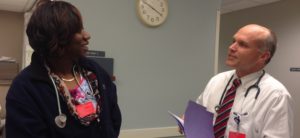Dr. Ronald Warner is a primary care physician at Brigham and Women’s Faulkner Community Physicians in Hyde Park. He is President of the Brigham and Women’s Faulkner Medical Staff.

As a community physician in the Hyde Park office of Brigham and Women’s Faulkner Community Physicians, I see patients who were born and raised in Hyde Park as well as a large patient population from all over the world who have settled in the neighborhood. While global health often involves a physician traveling to other parts of the world, my patients come from across the city with deep roots to many countries. It’s an honor to connect with patients and their families, to understand the contexts of their lives outside the walls of our office.
Our patient population is a mix of individuals from very different backgrounds and for me personally it’s always interesting and important to hear how they came to us and what they’re doing. Marc and Monique are two of my patients who were born in Haiti and now live in Jamaica Plain. Their lives are not easy given their heath status. Marc has Parkinson’s disease and Monique has COPD. They both also have diabetes. Their complex medical conditions mean their health needs close monitoring. Luckily, their daughter Mirlande lives nearby and is able to help coordinate their care with my office and myself.
Recently, Mirlande had concerns about her parents traveling to Haiti for an extended visit so she consulted me. I recommended that they go to Haiti over the winter since with their illnesses getting out of the cold is a good thing. Working with Mirlande, I was able to monitor her parents’ health while they travel. Mirlande is instrumental in helping to coordinate their care and she functions as a part of our care team. She sends me email updates regularly regarding their health status. If medications are required while they’re in Haiti, Mirlande sends me an email and their prescriptions can be called in locally and the medications can be forwarded to them in Haiti.
During this most recent trip, both Marc and Monique’s health began to fail. Mirlande notified me of the situation. Marc was having increasing difficulty walking due to his Parkinson’s. Monique was having increasing respiratory difficulties. They arrived at Logan Airport and it was my advice that they proceed directly to Brigham and Women’s Faulkner Hospital’s Emergency Department given their tenuous medical status. They could have gone to other closer hospitals on the way from the airport, but they have always been pleased with the care from BWFH’s ED and inpatient medical teams and decided to go to there. This is truly their medical home.
In BWFH’s ED, Marc and Monique were met by my colleague Luis Lobón, MD, MS, Chief of Emergency Medicine and Vice Chair of Community Emergency Medicine for Brigham Health. Marc required admission to the regular medical floor. Monique required admission to the medical intensive care unit. Both of their conditions were stabilized and they were both discharged successfully to rehabilitation facilities. They were very happy with the personal care that they received in such a timely and urgent manner.
It is gratifying that Mirlande and her siblings are incredibly grateful for this coordinated care. Together with my team we focus on medical care, housing and other needs. When I discussed this reflection on the intersection of global health and care at home, and the collaboration between provider and family she kindly said: “You are always willing to write a letter and always willing to give advice on what to do. There isn’t a time that I can’t get a hold of you. If you can’t email me the same day, it’s the next day. Every question that I have asked, he has answered.”
This is why I became a community physician more than 20 years ago. One of the biggest joys as a primary care physician is knowing patients over a long period of time. Physicians appreciate the social determinants that impact the lives of our patients. In the case of Marc and Monique, their deep roots in Haiti are not incidental to their care. Having them as patients means understanding travel to Haiti is integral to their sense of wellbeing and if I am committed to seeing them thrive, it’s an essential part of their care to work with their family to make this possible. When you have a real comfort level with your patients and they have a comfort level with you, that’s huge. You know them well; you know their families; and, if you stay in a place long enough, the relationships that you forge with your patients are priceless. Whether my patients are in Haiti or Hyde Park I remain deeply invested in their care.
